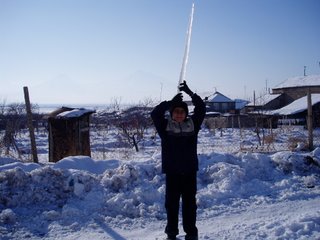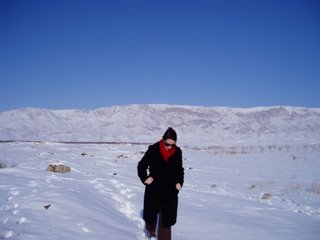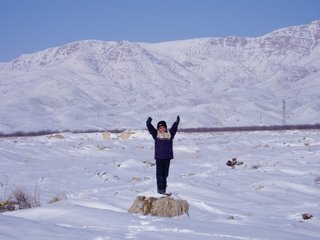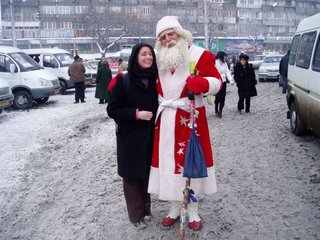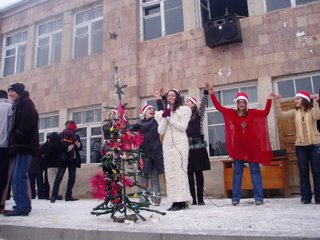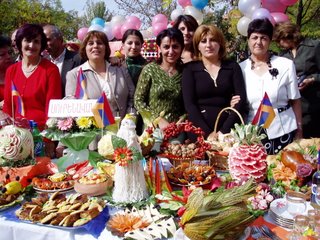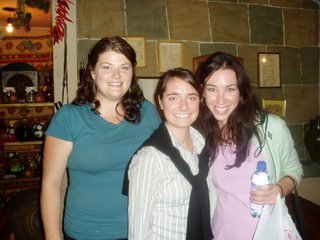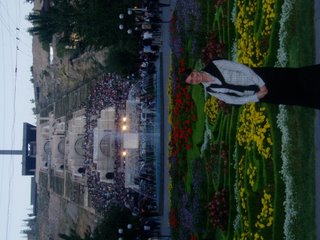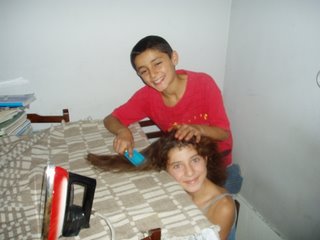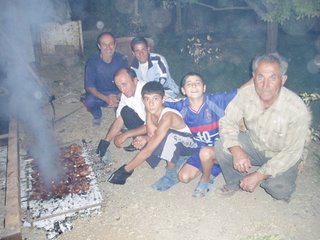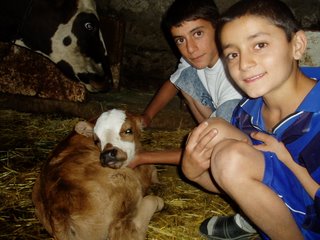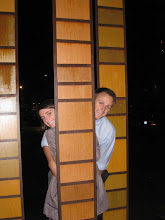A few storks arrived early this year and have begun building their nests on top of the telephone poles in my village. Everything seems to be developing these days as the weather is warming up and people are starting to come out of winter hibernation. In my village people refer to March as ‘the stupid month’ because the weather changes day by day and there’s no way to know if tomorrow will be sunny and warm or windy and snowy. I don’t mind so much as long as the cold doesn’t stay for more than a few days (I don’t want our water supply to freeze again).
It’s back to ‘work’ as normal in the school as far as six periods and reliable scheduling is concerned. Classes are a little more focused and I’m already pestering my counterpart to consider how we’re going to get all of the lessons completed before the end of May. Since we only meet with each grade once per week I recently realized that we have less than 10 classes remaining and I started to panic.
On March 20, I went door-to-door hand delivering 33 small invitations to active community members for our focus group (take two). This process started a month ago and after a failed attempt on March 11th we finally figured out how to request attendance effectively and had more than 40 people attend our meeting on the 23rd.
It’s no wonder it took us two tries, nothing is the same as in America. I thought that working with an Armenian would help prevent cultural miscommunications, but Alla was equally as astonished when we planed the meeting, explained the funds available, gave people two weeks notice and still lacked a single attendee. After we recovered from the discouragement, I sat down with my counterpart and questioned my work in the village. “If my work in the school is less important than obtaining funding for a community project, and no one in the community shows up to support a community project, there must not be a need for a volunteer in this village,” I whined. “Don’t worry,” she said. “Everything will be fine.” I was getting pretty tired of hearing that everything would be fine so the next day Alla and I were sitting in the mayor’s office. He agreed with the school director that there was a need to obtain funding and I told him that if this was important for the village I was going to need assistance in rallying the troops. Two days latter the school director presenting me with a list of names and we created the paper invitations.
More than a month ago we distributed a survey to 120 community members. I wanted to involve our Youth Action Committee, so I called a meeting of the 8th-10th graders and 12 students showed up to learn about survey writing and distribution. With careful directions, we sent each student out with ten copies of the survey and instructions to target a specific audience. We wanted equal distribution of males and females from the age of ten to adulthood. They did a great job of returning a majority of the completed surveys and we were pleased with the fact that more than 50 villagers shared their name, contact information and willingness to assist us in our work. Unfortunately the students volunteered to distribute surveys, they didn’t agree to sit down and explain the project, the Peace Corps, me or the reasons for a meeting. I knew we would have the same problem if I let them distribute the invitations and I needed people to be aware of why they were being summoned to the school on a Wednesday afternoon (prime soap opera time).
Things I learned from the first failure:
Not everyone in the village has a phone. Some people wrote their relatives or neighbor’s phone number on the surveys we distributed. When Alla made the calls asking them to attend an organizational meeting most people had no idea why she was calling them or why they should come.
Sunday is a day of work in the village. We weren’t requesting the participation of teachers, and for the most part the only women who work out of the home are teachers. We assumed that a Sunday (for someone who is in the home every other day anyway) is a fine day for someone to spend an hour in the school. We were wrong. Even if you’re home every day, Sunday is particularly busy with hosting guests and students who are back in the village from Yerevan (where they study during the week) for the weekend.
Whereas it was too cold to work in the fields on the 10th of March, the weather on the 11th was warm and sunny and everyone decided to go into the field and check out the crops.
You do not invite anyone to do anything more than a week in advance. This was the greatest shock to me. It doesn’t matter the occasion. Even wedding invitations are only sent out with a weeks notice. The fact that we were having a meeting meant that we should demand participation (make it sound important enough for them to drop their previous plans) the day before.
If you want people to do something, get their autograph. My school director informed me that if people sign their name to something it means that they are making a commitment. She told us to prepare a list of the invitee’s names and take it with us when we distribute invitations. If they plan to come have them sign and write down their phone number. If they can’t make it don’t let them sign the paper.
So, after school, a fifth grade presentation on the Armenian army’s 15th anniversary and the 9b vs. 10a basketball tournament I set out with two students to distribute the invitations. They weren’t organized and could care less about the process so we walked from house to house, up and down the village from 3:30 p.m. to 7:45 p.m. I didn’t mind all this walking because with each invitee I was able to explain the purpose of the meeting, get their signature and introduce myself (even though everyone already seems to know who I am).
The result was excellent attendance on the 21st. Even people we didn’t invite came to offer their ideas. The meeting was a little bit like my classroom (rowdy and noisy) but I realized that these people are just passionate. After having them work in small groups to brainstorm the communities greatest priorities (a new practice they did not enjoy much at all), we called for five of the top suggestions and created a voting matrix on my chalkboard. The votes went in favor of a renovated football stadium (we have a dirt field currently, I think they were envisioning the horseshoe) and people went crazy when I admitted to them that their vote had spoken and this was what they’d chosen to work on. One of the older males called for a smoke break and we came back a little more focused on the reasonability and urgency aspects of the project. After wiping the football project from the vote completely they almost unanimously agreed to call for a playground/workout center for the village. I agree that this is project will meet a great need and will be beneficial for all age groups. In addition to playground equipment I would like to add exercise stations for older youth and adults and benches or tables for the tatiks and papiks (grandmas and grandpas) to sit and play nardi (backgammon) or chess. People of all ages already gather in the dusty streets to socialize, why not create a central, safe location for community activities?
Although this work is just beginning, Alla and I are activity pursuing our summer green camp for 11 to 13-year-olds. We’ve secured a volunteer to be our camp cook (by far the hardest and messiest job) and we are currently recruiting counselors by posting flyers by the village stores. We hope to have an organizational meeting for interested volunteers on March 31st.
Please keep Alla in your prayers. I don’t know what I would do without this engaging, active and passionate new Armenian friend.
 I made the orange one
I made the orange one






